Von der Leyen’s authoritarian plot National democracies will be subordinate to her Commission
Ukraine Hawk Who Heads European Commission Has a Nazi Pedigree She Does Not Want You to Know About
I would like to share with you all two note-worthy articles on the subject of Ursula von der Leyen who has created a new European Commission that appears will be entirely in service to her particular vision for the future of Europe. And thus, it is important to know about this vision as well as her family’s history in Operation Gladio. People can also read more about Gladio in my paper:
Also see:
It is imperative that all citizens who truly wish to oppose tyranny and dictatorship inform themselves about this very important piece of recent history that continues to loom over all of our heads today. In other words, it is time to think about finally winning WWII. - Cynthia Chung
Von der Leyen’s authoritarian plot National democracies will be subordinate to her Commission
By Thomas Fazi
The European Union is about to enter what could prove to be the most ominous phase in its troubled history. In a few weeks, Ursula von der Leyen’s new European Commission will officially take office, at which point she will have almost unfettered control over the bloc’s politics.
When von der Leyen introduced the new Commission’s lineup and organisational structure last month, even the typically Brussels-friendly mainstream media was forced to admit that what she had pulled off was nothing short of a coup. By placing loyalists in strategic roles, marginalising her critics, and establishing a complicated web of dependencies and overlapping duties that prevent any individual from gaining excessive influence, the Commission President has set the stage for an unprecedented supranational “power grab” that will further centralise authority in Brussels — specifically in the hands of von der Leyen herself.
She is busy transforming the Commission “from a collegial body into a presidential office”, noted Alberto Alemanno, EU law professor at HEC Paris. But this is the culmination of a longstanding process. The Commission has been stealthily expanding its powers for a long time, evolving from technical body into full-blooded political actor, resulting in a major transfer of sovereignty from the national to the supranational level at the expense of democratic control and accountability. But this “Commissionisation” is now being taken to a whole new level.
Consider the bloc’s foreign policy, and its defence and security policy in particular. It has gone relatively unnoticed that von der Leyen has used the Ukraine crisis to push for an expansion of the Commission’s top-down executive powers, leading to a de facto supranationalisation of the EU’s foreign policy (despite the fact that the Commission has no formal competence over such matters), while ensuring the bloc’s alignment with (or, rather, subordination to) the US-Nato strategy.
“The Commission is evolving from technical body into full-blooded political actor.”
A signal aspect of this move has been the appointment to key defence and foreign policy roles of representatives from the Baltic States (total population: a bit more than 6 million), which have now been bumped up the political food chain because they share von der Leyen’s über-hawkish stance toward Russia. One particularly important figure is Andrius Kubilius, former Prime Minister of Lithuania, who, if confirmed, will take on the role of the EU’s first Commissioner for Defence. Kubilius, known for his close ties to US-funded NGOs and think tanks, will be responsible for the European defence industry and is expected to push for greater integration of military-industrial production. Furthermore, Kubilius served on the advisory board of the International Republican Institute and is a former member of the Atlantic Council’s EuroGrowth Initiative — two Atlanticist organisations whose primary objective is to promote US corporate and geopolitical interests around the world.
Kubilius’s nomination comes alongside that of Kaja Kallas, former Prime Minister of Estonia, to the role of European foreign and security policy chief; of Finland’s Henna Virkkunen to the role of executive vice-president and Commissioner for Technology; and of Latvia’s Valdis Dombrovskis, to Commissioner for Economy and Productivity.
It should come as no surprise that the Atlantic Council, which has distinguished itself for its very hawkish approach to the Russia-Ukraine conflict, has welcomed the formation of this “Baltic squad”, seeing it as a signal that the EU considers Russia to be its “primary threat”, and that the bloc will remain in lockstep with America on Ukraine and other key geopolitical issues, such as China.
In addition to reshaping the EU’s foreign policy, von der Leyen is also seeking to centralise the Union’s budget process — a move that would further consolidate her power. Under the current system, around two-thirds of the EU’s structural funds are covered by the bloc’s regional or social cohesion policy, whereby the money is given directly to regions, and largely managed by them, for the implementation of EU-approved projects. But von der Leyen now plans to radically upend the system.
The new budget plan for the period 2028-2034 proposes the creation of a single national pot for each member state, which will determine spending in sectors ranging from farm subsidies to social housing. Under von der Leyen’s proposed model, the money would no longer be given to local bodies but to national governments, conditional — and this is key — upon the implementation of reforms dictated by Brussels. This would essentially create an institutionalised system of financial blackmail, offering the Commission a powerful tool to pressure countries to conform to the EU’s agenda by withholding funds in case of non-compliance. Critics also argue that this is a smokescreen to cut existing programs and divert money towards new priorities, such as defence and industrial build-up.
The plan further calls for an ad hoc steering group that will handle the budget process. This group will comprise von der Leyen herself, the budget department, and the Secretariat General, which operates under the President’s direct authority. This centralisation will shift power away from regions, which often have a more conservative political leaning, and other Commission departments, into the hands of von der Leyen.
The President’s increasingly authoritarian approach was obvious during a confrontation at the European Parliament with Viktor Orbán, when von der Leyen broke diplomatic protocol to deliver a scathing attack on the Hungarian Prime Minister. She lambasted Orbán for maintaining diplomatic and economic relations with Russia, calling him “a security risk for everyone”, and implicitly criticised his attempts to try to broker a peace deal with Vladimir Putin. Orbán pushed back, calling out the catastrophic failure of the EU’s Ukraine strategy, and arguing that the European Commission should be “neutral” and a “guardian of the treaties”, and that von der Leyen was instead acting in an inappropriately political manner.
“Europe is not in Brussels, not in Strasbourg”, Orbán said. “Europe is in Rome, Berlin, Prague, Budapest, Vienna, Paris. It is an alliance of nation-states”. In substantive terms, Orbán is, of course, right: European nations and their peoples are the repositories of Europe’s cultural, civilisational and, dare I say, spiritual capital. In a fundamental sense they are “Europe”. But the truth is that the EU stopped being “an alliance of nation-states” a long time ago.
Over the past 15 years, the Commission has exploited Europe’s “permacrisis” to radically, yet surreptitiously, increase its influence over areas of competence that were previously deemed to be the preserve of national governments — from financial budgets and health policy to foreign affairs and defence. As a result, the EU, through the Commission, has effectively become a quasi-dictatorial sovereign power with the authority to impose its agenda on member states and their citizens, regardless of their democratic aspirations. This “competence coup” reached new heights under the first presidency of Ursula von der Leyen (2019-2024), in response to the Covid-19 and Ukraine crises — and is now on the verge of being institutionalised with her second term.
In many respects, the feeling is that the EU has definitively entered its late-Soviet stage. Faced with the bloc’s societal and economic breakdown, escalating geopolitical crises, collapsing democratic legitimacy and mounting “populist” uprisings, Europe’s political-economic elites have chosen to declare all-out war on what is left of democracy and national sovereignties. The bolts of the EU’s techno-authoritarian regime are being screwed tighter and tighter. For a glimmer of hope, we might turn to the history of the Soviet Union itself: 30 years ago, the authoritarian backlash to the crisis of the Soviet system simply accelerated the regime’s demise. Will the same prove true for the EU as well?
[Originally published on UnHerd.]
Ukraine Hawk Who Heads European Commission Has a Nazi Pedigree She Does Not Want You to Know About
By Evan Reif
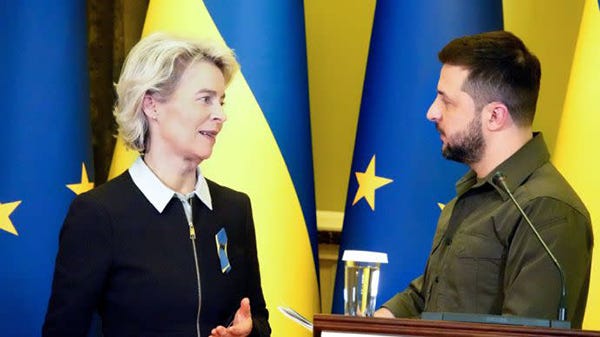
Her father Ernst Albrecht, President of the German state of Lower Saxony from 1978 to 1990, brought unrehabilitated Nazis into his administration and carried out a black-flag terrorist operation designed to discredit the left-wing Red Army Faction.
In the wake of the Russo-Ukrainian war, terms like “European values” have come back into the mainstream. One of the people who has been most responsible for this is Ursula von der Leyen, the president of the European Commission who is now a nearly omnipresent figure in the media.
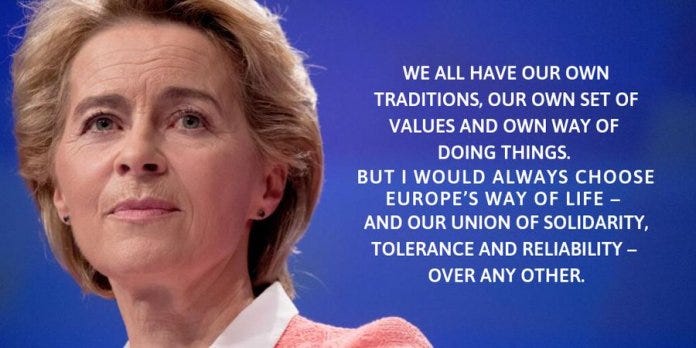
According to Ursula, “European values” represent only the highest attributes of humankind: freedom, justice, solidarity, and rule of law.
Of course, anyone with even a passing knowledge of history can tell you that these are nothing but euphemisms. Not long ago, “European values” meant something very different. Those values drew the borders of the world in oceans of blood, both of Europeans and those they conquered. A look at the history of Ursula’s aristocratic European family can show us the true face of these “European values” and how the ruling class profited from imposing them on the world.

Sins of the Father
“If we succeed in bringing people of above-average capabilities to governance an autocracy or the rule of the few will be able to create a better order than the rule of the people.” – Ernst Albrecht
Ursula von der Leyen is the scion of two aristocratic German families. She was born Ursula Albrecht, the daughter of a prominent European bureaucrat, CDU party leader, and former governor of Lower Saxony, Ernst Albrecht. The family carefully nurtured a cosmopolitan image as Ernst spent most of his life working for the EU and various precursor organizations. Growing up, Ursula was nicknamed “Röschen” (Rosie in English) by her father, and images of the happy family featured heavily in her father’s political advertisements.
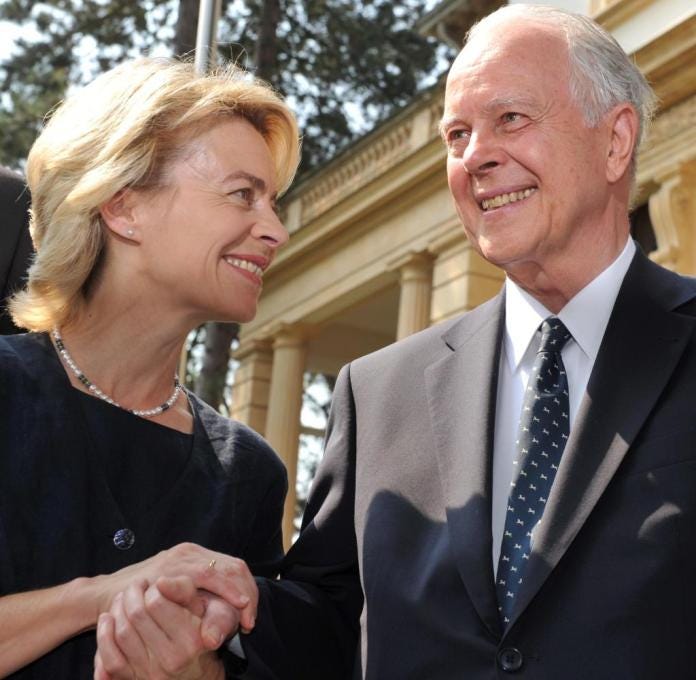
The Albrecht family made its fortune by using its position as customs enforcers in the Holy Roman Empire to dominate the cotton markets of 19th-century Bremen and, from there, the name Albrecht has been a fixture throughout German history.
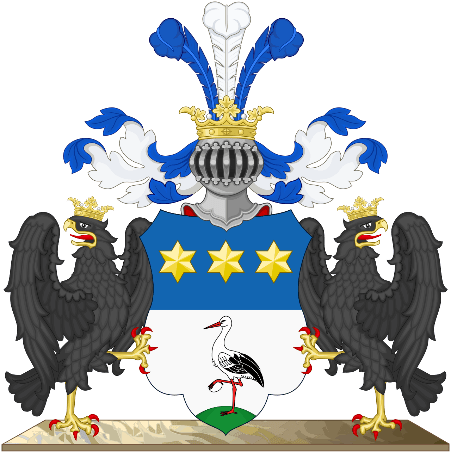
As is typical for bourgeois Germans, the otherwise exhaustively documented history of the Albrecht family has a mysterious gap between 1936 and 1945. To avoid uncomfortable questions about where their power and money came from and what they did to earn it, the House of Albrecht, like so many others, is content to pretend the Nazi regime simply never existed. Since we will never have answers, perhaps if we raise a light to what surrounds this void, the shadow it casts can show us the true shape of the “European values” Ursula is so fond of.
To begin, we can look at Ernst’s first job in politics, with the European Coal and Steel Commission under the direction of another aristocrat, Hans von der Groeben.
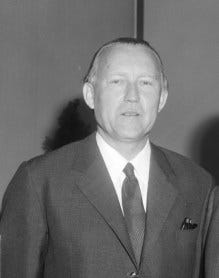
Hans was already a long-time bureaucrat by this point. During the war, he worked as a deputy for the Reich Ministry of Agriculture under the command of Richard Walther Darré. Darré was a fanatical Nazi, writing his first fascist propaganda in 1926 and joining the Nazi Party in 1930.
He soon joined the SS and his loyalty and dedication to the cause led Heinrich Himmler to personally select Obergruppenführer Darré as head of both the SS Race and Resettlement Office and later the Reich Department of Agriculture. Darré was one of the party’s leading ideologists, and he combined the tasks of the agricultural and race offices to set the foundation for Generalplan Ost, the Nazi plan to exterminate the entire Slavic race and colonize Eastern Europe.
Darré was the architect of the Nazi “blood and soil” agrarian policies and sought to create a new land-owning “Aryan” aristocracy. He passed laws requiring an “Aryan certificate” to inherit farmland and was instrumental in Nazi eugenics programs, particularly the Lebensborn program, designed to breed a new generation of “Aryan” supermen and purge the German people of “undesirable bloodlines.”

One of his most promising acolytes was a doctor by the name of Josef Mengele who was put in charge of “racial health” policies within the department. Mengele would later go on to become the infamous angel of death who carried out some of the vilest crimes in history with his industrial-scale medical experiments at Auschwitz concentration camp. Mengele particularly targeted children as his victims and kept them alive for months to gain as much data as possible. He never forgot where he came from: Mengele always cited Darré as inspiration for his ideas on “racial hygiene.”
After the war, Mengele escaped justice by fleeing to Argentina and later Brazil on the “rat lines” operated by CIA agent, future head of West German intelligence and unreformed Nazi Reinhard Gehlen and was protected under the personal order of CIA Director Allen Dulles, who viewed Mengele as a useful ally in his war against the USSR. Mengele died a free man in 1976 and was buried under the name Wolfgang Gerhard in São Paulo, Brazil.

Darré was proud of his work. He wrote thousands of pages outlining his plans in various publications, and routinely gave speeches inside Nazi Germany promoting his ideas.
“By blitzkrieg…before autumn…we shall be the absolute masters of two continents…a new aristocracy of German masters will be created….[With] slaves assigned to it, these slaves to be their property and to consist of landless, non-German nationals…we actually have in mind a modern form of medieval slavery which we must and will introduce because we urgently need it in order to fulfill our great tasks. These slaves will by no means be denied the blessings of illiteracy; higher education will, in future, be reserved only for the German population of Europe…” – Richard Darré
Together with Hans von der Groeben, they implemented what was known as the Hunger Plan to feed the Reich at the expense of conquered territories. Millions of slaves worked on starvation rations, forced to send every morsel of food to the Reich where it would be used to quite literally sustain the Nazi machine which oppressed them. By 1944, more than 15 million tons of foodstuffs had been requisitioned from the USSR, and this led to the intentional deaths by starvation of more than 10 million people. According to Darré’s plan, after they had been all been sterilized and starved to death, the Slavic “Untermensch” was to be replaced by Darré’s new race of “Aryan” aristocrats, ready to use this land for the benefit of the Reich.
After the war, Darré was arrested and tried for war crimes at Nuremberg. He was found guilty, but despite the scope and scale of his crimes, he received a sentence of only seven years. He served just three of them and was released in 1950. He died of liver cancer in 1953. While this sentence was shockingly lenient, it could have been worse. Hans never saw the inside of the courtroom.
This was very common after the war. The “liberal internationalists” such as Allen Dulles, in charge of American foreign policy, were not bothered by the crimes of the Nazi regime. Indeed, as early as 1940 Dulles was already arguing for an alliance with Nazi Germany, and in 1944 was meeting with Nazi intelligence to arrange a separate peace to use the Nazis as a weapon against the USSR.
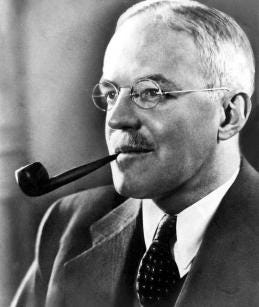
They sought only trials for the most egregious Nazis and, even then, ensured that their sentences were as lenient as possible. The rank-and-file of the Nazi regime, the army of people who physically made the Nazi machine do the murderous work of subjugating and exterminating an entire continent went almost entirely unpunished for their crimes.
In the case of people like Hans von der Groeben, they were rewarded with jobs in the new “de-Nazified” West German government. Despite the pretenses of a new Germany, only the names changed. The same bureaucrats labored toward the same goal, the destruction of the Soviet Union and its people, by any means necessary. The state machinery once called the Greater German Reich had now simply been absorbed into a new structure, now called the North Atlantic Treaty Organization (NATO).
Now in the position of the deputy, Ernst Albrecht took on the same role his boss had in the 1940s, this time with “blood and soil” replaced with “European values.”
Although Ernst Albrecht was a few years too young to have been a Nazi himself, throughout his long political career he made his sympathies very clear. Ernst was an elitist dripping with contempt for the common people and wanted to bring about what he deemed elite rule in Germany as opposed to the rule of the “uninsightful” mob. Given that he never missed a chance to venerate the Third Reich and its killers, it is very clear whom Ernst considered elite.
“The rule of the people, especially direct rule, is essentially such that decisions are not determined by the insight of the insightful [elite], but rather by the common average level based on the majority of the population.” – Ernst Albrecht, The State, Idea and Reality: Outlines of a Political Philosophy
During his time as leader of the Christian Democratic Union (one of Germany’s two largest political parties) government of the German state of Lower Saxony, Ernst successfully wooed members of the neo-Nazi Deutsche Reichspartei (DRP) into the ranks of the CDU. The DRP practiced what was known as Esoteric Hitlerism, a bizarre variety of neo-Nazism that claims Hitler is the literal reincarnation of the Hindu god Vishnu and the “Aryans” of Nazism are the same Aryans who once inhabited ancient India.
The ideology was created by Savitri Devi, a French-born Nazi spy who had been expelled from Germany in 1951 for repeatedly spreading Nazi propaganda and came to the DRP through Devi’s closest friend, Nazi pilot Hans-Ulrich Rudel, who was working as an arms dealer for South American fascists and actively plotting to overthrow the German government in favor of a Nazi dictatorship.
Rudel and Devi believed that, if they succeeded in building a new Reich, Hitler would be reincarnated once more as the Hindu god Kalki to cleanse all inferior races and lead the “Aryan” people to a paradise called Hyperborea. Despite this, Albrecht’s CDU absorbed the DRP almost completely, as they were worried that the DRP would otherwise erode their voter base. The strategy of kowtowing to Nazis worked, and Albrecht’s CDU governed the region continuously from 1976 to 1990.
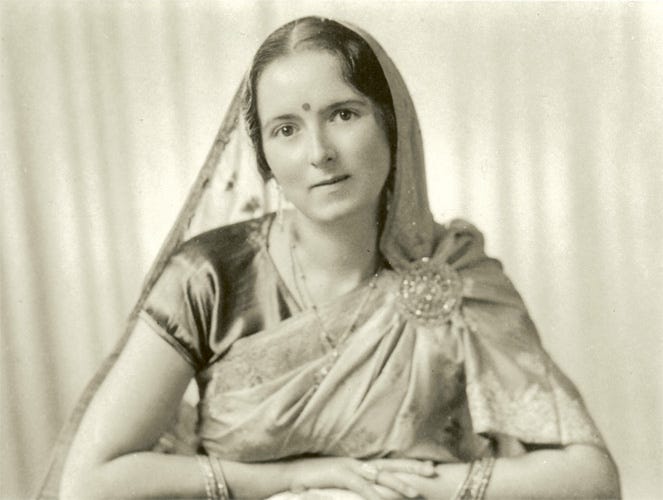
When he came to power, one of the elites Ernst entrusted to rule was his justice minister, a jurist by the name of Hans Puvogel. Once again, he picked a fanatical Nazi. Puvogel joined the Sturmabteilung, the paramilitary arm of the Nazi Party in 1934 and, by 1937, he was a regional leader in the German Nazi Party (NSDAP). Puvogel used his skills as a lawyer to help justify the extermination of Nazi racial enemies. In his doctoral thesis, he argued for the mass euthanasia and sterilization of all inferior races as a way of solving the Nazi “race problem.”
When he was exposed in 1978, Puvogel lied and said he was in a small right-wing group called Steel Helmet which was absorbed into the Nazi Party, but maintained he had no Nazi past. Documents released by the Lower Saxony parliament in 2012 have proven that this was a lie. Puvogel never even tried to distance himself from the contents of his dissertation, and as far as anyone knows he went to the grave a committed Nazi. For his part, Ernst Albrecht simply never mentioned it. The strategy of simply pretending the Third Reich never existed paid off once more as Albrecht himself faced no real consequences.
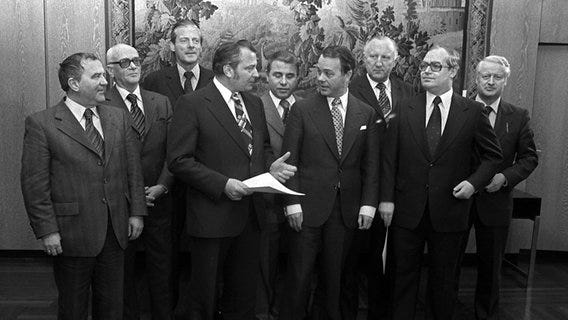
“An individual’s worth in the community is measured by his racial personality. Only a racially valuable person has the right to exist within the community. Someone who is useless for the community because of his inferiority, or even harmful to it, is to be eliminated.” – Hans Puvogel
Ernst did not just work for Nazis, fill his cabinet with Nazis and invite Nazis into his party; he also spent a great deal of time courting Nazi voters. Ernst and his deputies were fixtures at Nazi veteran events throughout Lower Saxony.
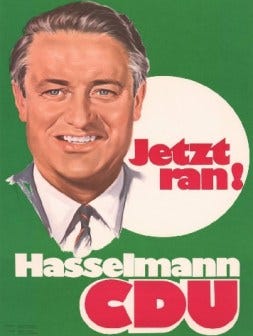
Albrecht’s deputy minister, close friend, and Nazi officer Wilfried Hasselmann even gave the keynote speech at a Knight’s Cross Association dinner in 1978, in which he venerated the worst killers of Hitler’s Reich as brave and honorable men, whose courage was an example for future generations who would be inspired by their “European values.”
Albrecht and Puvogel were also involved in a bomb attack known as the Celle Hole scandal. On the 25th of July, 1978, a bomb was detonated on the wall of the prison, in Celle, Germany. The bomb did not have the desired effect, creating only a small hole, and a group of 12 men who were supposed to enter the prison were forced to flee. The perpetrators escaped, but a Mercedes was found loaded with a rubber raft, escape tools, a Walther handgun, and forged passports, one of which had a picture of jailed left-wing militant Sigurd Debus. Later, tools were planted in Debus’s cell to seal the deal, making the whole affair seem like a failed escape plan from the Red Army Faction (RAF).
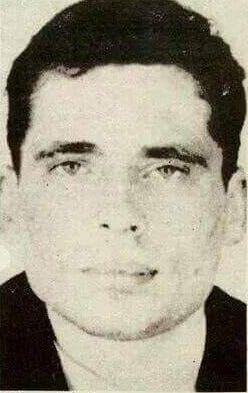
Albrecht hailed the attacks as a successful operation, which he claims stopped a robbery and murder (he provided no evidence for this), and the incident was used to justify the worsening of conditions for Debus and other jailed RAF members. The RAF responded with a hunger strike, which eventually led to the death of Debus in 1981.
However, the story never quite added up. The RAF members maintained their innocence, and mounting pressure from lawyers and the public eventually led to a parliamentary inquiry in 1986, which found that there was no escape attempt, no robbery or murder, and that the entire affair was a false-flag attack called Operation Fire Magic, planned by the German Federal and Lower Saxony police with the approval of Ernst Albrecht. A Lower Saxony policeman even detonated the bomb. Despite this, nothing happened to Albrecht or his government. The embarrassing affair was quickly hushed up, and Debus’s death was reduced to little more than one name on the long list of those who have starved to death for the benefit of the Albrechts.

It is still unclear why Ernst Albrecht carried out this terrorist attack against his own country; however, it is possible that it was linked to persistent rumors that the RAF was seeking to kidnap his beloved daughter Ursula in retaliation for Ernst’s Nazi sympathies. Because of rumors, when Ursula enrolled in the London School of Economics, she did so under the assumed name of Rose Ladson to conceal her identity. That name was not chosen at random. Rather, it is the link to another time House Albrecht’s “European values” were imposed upon the world.
The Dixie Rose
The religious and moral instruction of the negroes has, for several years, been a subject of great interest to me, and I am satisfied that our exertions in their behalf (although much, very much, yet remains to be done) are not only misunderstood abroad, but unappreciated. To improve the negro is a far more arduous task than many, who have no experience in teaching them, are aware. They are naturally dull, and of a weak intellect, but generally possessing good memories; and those who have been engaged in this work of charity, have to lament, after much labour, that the instruction they have endeavoured to give, although remembered, has been perverted and misdirected. – James H. Ladson, “The Religious Instruction of the Negroes”
Ursula chose her name after another branch of her family, the Ladsons of South Carolina. The Ladsons were a family of slave traders, plantation owners and secessionists. Although the Ladsons do not bear an aristocratic title like Albrecht or von der Leyen, they bore all the same hallmarks of the European aristocracy. The Albrecht cotton business brought the family in close contact with the Ladsons and the relationship grew until, in 1902, Mary Ladson-Robertson married Carl Albrecht, joining the two families by blood.
The colonial ties of the Albrecht family may explain why they were so comfortable around Nazis. Besides the obvious parallels regarding the enslavement and economic exploitation of entire races of people, the colonization of a continent, the racial hierarchies, and mass murder on an industrial scale, the Nazis were ardent admirers of the American colonial system. They even specifically based their racial system on that of the American South.
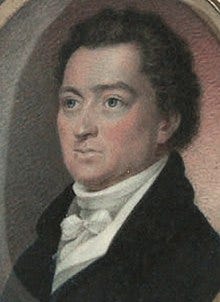
The Ladson family got its start on the path of infamy in Barbados when John Ladson immigrated from England in the mid-1600s. In 1679, John was among the first settlers in the new Carolina Colony, where he bought a plantation outside of Charleston, which the city has long since grown to encompass. At the time, Barbados was a major stopover point for the slave trade, and it was here that the Ladsons enjoyed their first taste of blood and money.
Barbados was the first British slave society. The beautiful Caribbean island was ruthlessly exploited for its natural wealth when it came under British control starting in 1630. Frequent slave raiding, disease, and intentional policies of genocide from the Spanish before them had exterminated the indigenous Arawak people, leaving the island ripe for repopulation by slaves. Its warm climate and fertile soil made it perfect for growing tobacco and sugarcane, which was then distilled into rum and sold throughout the world.
By 1636, laws were implemented ensuring that all Africans brought to the island and their descendants would be permanent chattel, with no provision to be freed. In 1661, the slave codes were strengthened, deeming all slaves to be real estate, alive for the sole purpose of creating value for their owners. Slaves were considered property first and human beings a distant second, if at all. The rules existed to protect the value of slaves as property, not their lives or dignity.
From 1630 to 1807, some 380,000 Africans were kidnapped from their homes, put in chains, and shipped to Barbados to be worked until they died. Untold thousands of those were sold by the Ladsons to plantations all over the hemisphere and their deaths and suffering made the family tremendously wealthy.
The slaves in Barbados suffered unimaginable brutality at the hands of slave masters like the Ladsons. From 1705 to 1735, the number of slaves imported into Barbados, in addition to those born there was roughly 85,000. However, due to the extreme mortality rate on the island, the total population increased by only 4,000.
Slave revolts, refusal to accept Christianity, or any acts of defiance from the chattel were put down with the absolute maximum amount of violence to serve as an example for the rest of the slaves. This torture and butchery were so common that most instances were never recorded but, in some cases, we have firsthand accounts of the brutality. One of these is from the diary of Father Antoine Biet, a French priest and missionary in 1654.
“They treat their Negro slaves with a great deal of severity. If some go beyond the limits of the plantation on a Sunday they are given fifty blows with a cudgel; these often bruise them severely. If they commit some other slightly more serious offense they are beaten to excess, sometimes up to the point of applying a firebrand all over their bodies which makes them shriek with despair. I saw a poor Negro woman, perhaps thirty-five or forty years old, whose body was full of scars which she claimed had been caused by her master’s having applied the fire-brand to her: this horrified me. As these poor unfortunates are very badly fed, a few occasionally escape during the night and go to steal a pig or something similar from a neighbouring plantation. But, if they are discovered, there is no forgiving them. One day I went to visit my Irishman. He had in irons one of these poor Negroes who had stolen a pig. Every day, his hands in irons, the overseer had him whipped by the other Negroes until he was all covered with blood. The overseer, after having had him treated thus for seven or eight days, cut off one of his ears, had it roasted, and forced him to eat it.”
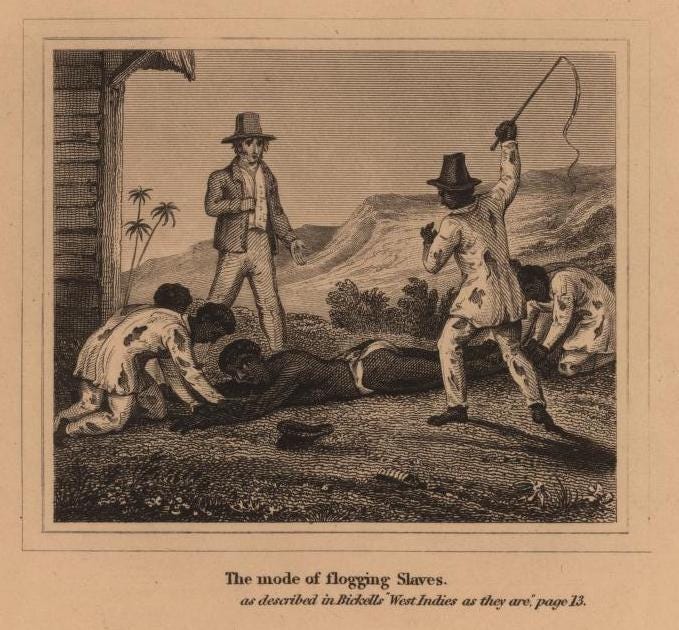
Despite this, slaves did resist. Acts of resistance ranged from speaking their native language in private to work stoppages, acts of sabotage, and even organized revolts. Sadly, the British authorities maintained a large and well-armed police force, and since Barbados’s forests were completely clear-cut to make way for more sugar cane, the rebel slaves had nowhere to hide. The revolts were always crushed, and slaves in Barbados were not freed until 1834, nearly 200 years after their first encounter with “European values.”
In South Carolina, the Ladsons consolidated their wealth and power, eventually becoming one of the most influential families in the state, with deep connections to finance, politics and, of course, slavery. Much like the aristocrats of Europe, the Ladsons strengthened their house through marriage to other elite families, most of whom were in the slave trade. Among their ancestors were men like James Moore, the former governor of Carolina who earned his position through genocidal raids in which more than 4,000 indigenous Apalachee people were taken as slaves, eventually leading to the complete extermination of the tribe.
In the 1790s, the Ladsons were able to secure their place at the top echelons of the slave trade through a marriage into the Wragg family. Joseph Wragg was the most prolific slave trader and one of the wealthiest men in the Americas. He started out as a captain on slave ships until he earned enough money to buy his own slave market and a plantation near Charleston. Between 1717 and 1747, at least 10,000 people were kidnapped from their homes, put in chains, and forced into the dark, overcrowded holds of “Guineamen” to be sold as chattel by Joseph Wragg and company at the Wragg wharf in Wraggborogh, South Carolina.
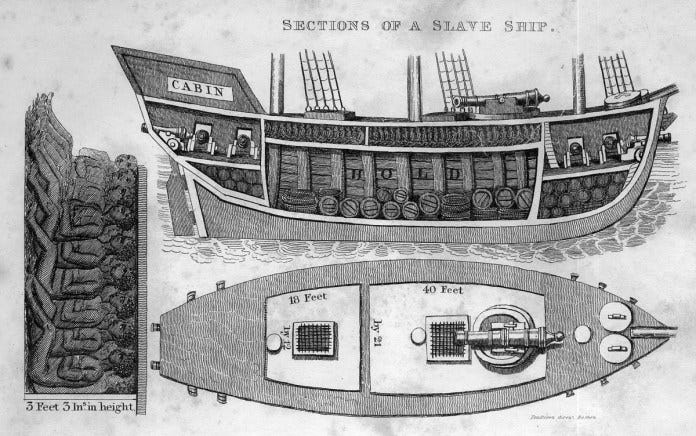
It is estimated that two million slaves perished in what was known as the triangular trade from Britain to Africa, to the Americas and back to Britain. As slaves were considered property first, every attempt was made to maximize profits even at the cost of human lives. To maximize their space efficiency, slaves were packed as tightly as possible, often leading to horrible outbreaks of disease and even suffocation.
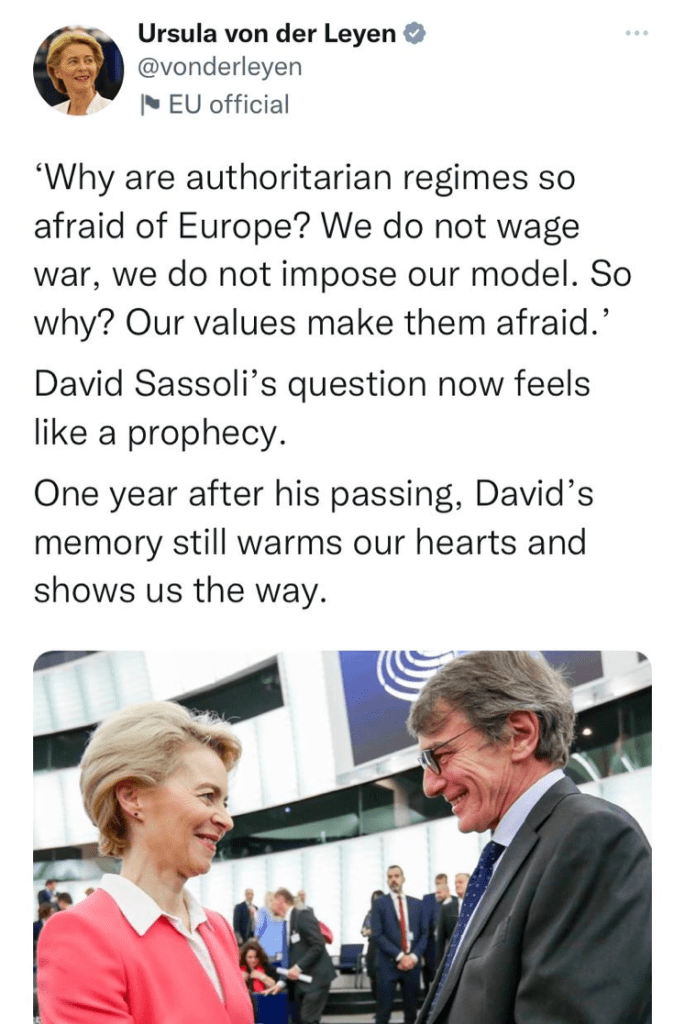
While expressing my horror at what I saw and exclaiming against the state of this vessel for conveying human beings, I was informed by my friends, who had passed so long a time on the coast of Africa and visited so many ships, that this was one of the best they had seen. The height sometimes between decks was only eighteen inches, so that the unfortunate beings could not turn round or even on their sides, the elevation being less than the breadth of their shoulders; and here they are usually chained to the decks by the neck and legs. In such a place the sense of misery and suffocation is so great that the Negroes, like the English in the Black Hole at Calcutta, are driven to a frenzy. They had on one occasion taken a slave vessel in the river Bonny; the slaves were stowed in the narrow space between decks and chained together. They heard a horrible din and tumult among them and could not imagine from what cause it proceeded. They opened the hatches and turned them up on deck. They were manacled together in twos and threes. Their horror may be well conceived when they found a number of them in different stages of suffocation; many of them were foaming at the mouth and in the last agonies—many were dead. A living man was sometimes dragged up, and his companion was a dead body; sometimes of the three attached to the same chain, one was dying and another dead. The tumult they had heard was the frenzy of those suffocating wretches in the last stage of fury and desperation, struggling to extricate themselves. When they were all dragged up, nineteen were irrecoverably dead. Many destroyed one another in the hopes of procuring room to breathe; men strangled those next them, and women drove nails into each other’s brains. Many unfortunate creatures on other occasions took the first opportunity of leaping overboard and getting rid, in this way, of an intolerable life.
– Rev. Robert Walsh, Notices of Brazil in Walsh, Notices of Brazil in 1828 and 1829
The Ladsons were also active in imposing “European values” on their victims. In particular, James H. Ladson (there are several James Henry Ladsons in this family, none of whom was given a suffix to tell them apart; for the sake of clarity, I will refer to this person as James H. Ladson) was noted for building a huge chapel on one of his plantations where he could impose “European values” on his slaves through forced conversion. This was typical of the South, where their brand of white supremacy took on a paternalistic character. Slave masters viewed themselves as noble, charitable people, bringing “civilization” to the savage Blacks that they brutalized for money. Civilization, much like “blood and soil” and “European values,” was nothing more than a bloody euphemism.
Indeed, the local newspaper called him “an excellent specimen of the old Carolina gentleman, pure in character, and high-toned in his dealings, and was for many years the head of the house of James H. Ladson & Co., now represented by the firm of W.C. Bee & Co. This firm carried on an extensive and lucrative business as rice and cotton factors. He was also a bank director, and for most of his life a leading member of St. Michael’s Episcopal Church of our city, where he stood foremost in Christian virtues and active benevolence.”
This fine southern gentleman was also a fierce devotee of the cause of “states’ rights,” yet another bloody euphemism, and one for which the Ladsons were willing to kill. The truth of “states’ rights” was revealed by Ladson’s own actions: He worked tirelessly for the cause of the Confederacy, and was quite clear that he did so to protect his economic interests.
All in all, 620,000 people died for James H. Ladson’s economic interests, including his own son, and another million were injured, many of them permanently maimed. For this, he suffered no consequences whatsoever, and kept every penny and all the prestige earned through the blood and suffering of slave and soldier alike.
Every Rose Has Its Thorns
“She has a profound European culture, she’s born in Brussels and is the daughter of a Brussels functionary so I can say she has the union’s DNA in her.” – Emmanuel Macron
It is not at all unfair to ask where Ursula von der Leyen’s family’s money and power came from, and what they did to earn it, especially given that Ursula has benefitted enormously from her family’s wealth and connections to further her own career, which can stand on its own as an example of corruption, severe scandal, incompetence and, possibly, even outright treason. Her time as a politician shows that Ursula’s apple has not fallen far from the Albrecht family tree.
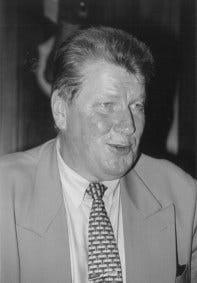
Ursula first entered politics in 2003 when she was defeated via technicality in a Hanover regional election primary by CDU stalwart Lutz von der Heide. This was unacceptable for Ursula’s father Ernst, who launched a full-court press alongside his old deputy and Wehrmacht artillery officer Wilfried Hasselmann.
The two set to work both campaigning for Ursula and smearing her opponent, who had held the seat for more than 15 years at this point. At the time, Ursula had a long-running column in far-right tabloid Bild, a newspaper founded by ex-Nazi propagandist and CIA asset Axel Springer which has been sanctioned dozens of times for violations of German law and, through this, she was able to effectively amplify their attacks on von der Heide. Soon, all of Germany was reading the latest dirt about a primary for a small regional election.
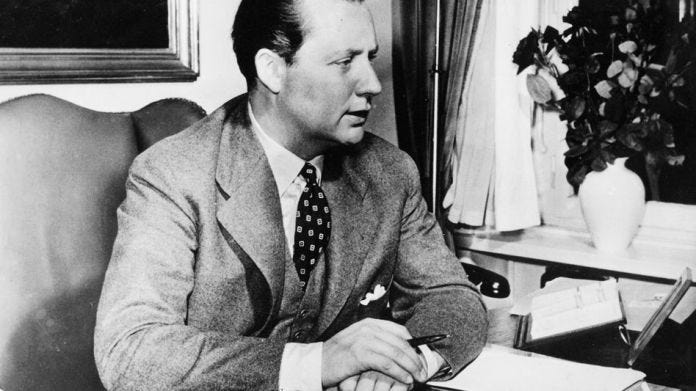
The campaign was decisive and, in the second round of voting, Ursula won by a two-thirds majority. It was a safe seat so, as the new CDU candidate, Ursula was elected easily. Considering this, it is impossible to separate Ursula von der Leyen from her father’s legacy.
Two years later, she was picked by Angela Merkel to serve as Minister of Labor and Family Affairs, despite her almost non-existent political experience. In this role, she was mostly noted for cutting social services for the blind and trying to ban heavy-metal albums, a resumé that would not seem to justify further promotion.
Despite this, she was promoted to Minister of Defense in 2013, a move which baffled the opposition. It was here that the “European values” of Ursula von der Leyen began to show their shape once more.
Ursula’s mandate was to expand and increase readiness of the Bundeswehr, and she set about the job with gusto. She began a constant drumbeat for war, arguing that the German army was too small and unprepared to face whatever new enemy she conjured up on that day. Be it Afghanistan, Iran, China, Russia or Syria, Ursula consistently advocated for more weapons, more war, and more money. Ursula even proposed a German foreign legion to bolster the ranks of the Bundeswehr, a proposal that was met with horror and condemnation from all sides.

Almost immediately, she said that the ministry required outside help and hired one of the favorite and most criminal consultants of the neo-liberal political class, the CIA-affiliated McKinsey, former home to such luminaries as Susan Rice, Chelsea Clinton, Pete Buttigieg and many other politicians and business executives of dubious character. McKinsey’s tendrils reach into governments and corporations throughout the world, and it exemplifies the “revolving door” among government, intelligence and big business.

It was more than just a consultancy: McKinsey was given direct control of the ministry, with consultant Katrin Suder awarded a new position inside the ministry to “reform the armaments sector.” Ursula shoveled nearly half a billion euros into the coffers of McKinsey and others for “consulting” services, and received absolutely nothing in return. The unelected Suder was seen so often beside von der Leyen that the opposition joked she was Ursula’s new bodyguard.
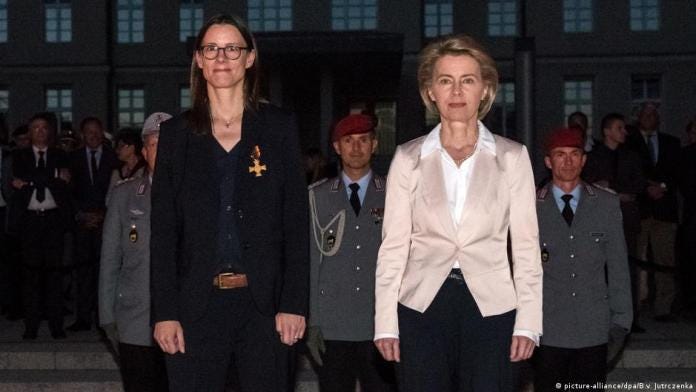
This brazen corruption became known as the “consultant affair” and was so severe that it led to a parliamentary inquiry, with opposition from both the left and right demanding answers from von der Leyen. Ursula responded mostly by stonewalling, simply refusing to answer questions or provide information, eventually destroying evidence of her misdeeds before she could be brought before Parliament. As there was no evidence, the inquiry failed. For her role in the affair, Katrin Suder was awarded the Bundeswehr Cross of Honor by von der Leyen.
The scandal was so serious, so brazen and so utterly baffling that the opposition Social Democratic Party openly accused Ursula von der Leyen of treason, working in the interests of the United States government as opposed to Germany:
As Federal Defense Minister, von der Leyen behaved as the U.S. President wanted when he called for increase in military spending: higher military budgets, increased armaments instead of disarmament. And although this minister got into trouble because of her high spending on consulting firms and various personnel decisions and was anything but a role model, she became President of the EU Commission. That is a key function and it is important for the U.S.
The decision for von der Leyen happened quietly backstage. No sensible person can explain why she was given this important office. A partial explanation is that she had the support of important countries from Eastern Europe. The United States has a great influence on these states.
In the first major critical case, von der Leyen immediately and unequivocally represented the U.S. position, where she said Iran itself is to be blamed for the confrontation in the Middle East and for the execution of the Iranian general. With her, the United States can probably also stake a claim on other occasions and play a key role in shaping the internal structure of the European Union. Ursula von der Leyen is the perfect example of an ‘agent of influence.’
– Albrecht Müller, SPD member of parliament January 2, 2021
Ursula’s Bundeswehr was more than just a fundraising scheme for a parasitic consultant class. It was also an incubator for the same vile ideology her father spent his entire life promoting. Under von der Leyen, far-right and neo-Nazi sympathies exploded in the ranks of the Bundeswehr.
Despite repeated warnings from both within and outside of the army, von der Leyen did nothing substantial. Her McKinsey consultants created sensitivity training courses for the army, and Ursula made constant publicity tours of military bases, but the problem continued to get worse. Finally, in 2018, a plot was uncovered from the elite Kommando Spezialkräfte (KSK) special forces unit to assassinate German politicians and overthrow the German government.

Further investigations in 2019 revealed that the special forces unit was not only infested with open neo-Nazis, but they had been actively planning to overthrow the German government for at least three years. Furthermore, despite being repeatedly warned, Ursula von der Leyen and her army of consultants had at best done nothing and at worst actively exacerbated the issue.
A raid uncovered caches of weapons, explosives and Nazi memorabilia. Further audits revealed 48,000 rounds of ammunition and roughly 135 pounds of plastic explosives unaccounted for, leaving many German politicians to question just how many more of these terrorist cells existed within the Bundeswehr. The missing ammo and explosives have never been found. In the end, the Ministry of Defense had no choice but to disband the KSK entirely.
Despite all of this, Ursula was considered a favorite to succeed Jens Stoltenberg as secretary general of NATO. Given the alliance’s history with Nazis, it should be no surprise that her ties to the far right were either ignored or, more likely, counted in her favor.
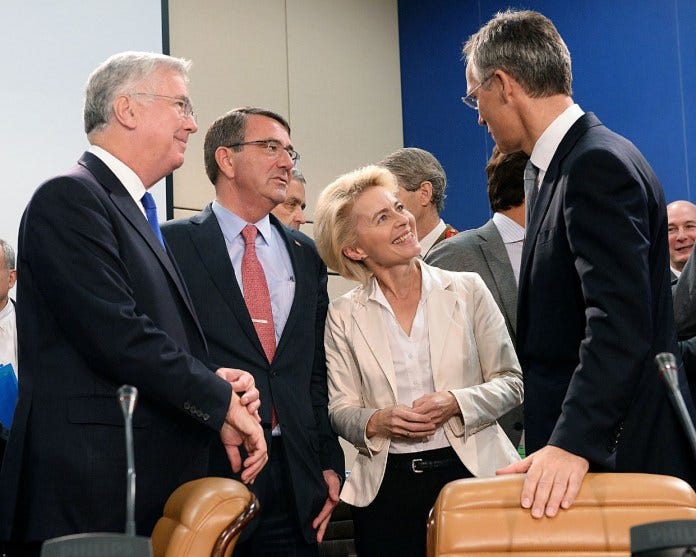
The reason Ursula was not chosen was because she had once again failed upwards and had already been elected president of the European Commission in a close election which she won despite almost universal condemnation from German politicians both from her own party and the opposition. Angela Merkel, von der Leyen’s boss and close friend, had to abstain from the vote after the German Parliament refused to even nominate Ursula.
The move was, however, welcomed by foreign politicians such as Emmanuel Macron, who released a laughable statement in which he said “I’ve seen her capacity to get things done, and to avoid being captive to particular interests” about the leader who only months before had been accused of treason for her complete submission to foreign special interests. Bloomberg called the woman who had spent nearly five years creating new cabinet positions for her friends and at best ignoring if not actively incubating a second Beer Hall Putsch a “Tough, Visionary reformer.”
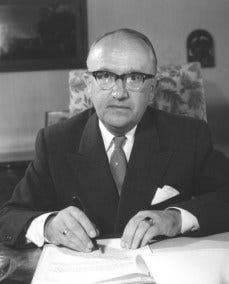
Ursula was the first woman to hold this position, and the second with any connection to the Nazis: Former Wehrmacht artillery officer and Nazi law professor Walter Hallstein had gotten his start in politics arguing for the virtues of the Nuremburg race laws as a young man, demonstrating his lifelong commitment to “European values.”
It was from her new platform in Brussels that the whole world got to see the “European values” of Ursula von der Leyen. After the outbreak of war in Ukraine, Ursula has dominated the news as one of the most forceful and steadfast advocates for more war, more sanctions and more weapons.
Ursula even toured Ukraine, stopping for a now-famous photo op in the recently reconquered Bucha, where she shed crocodile tears for the victims of a massacre that we are supposed to believe was caused by Russian forces shelling their own positions, but in reality was almost certainly caused by Ukrainian artillery.
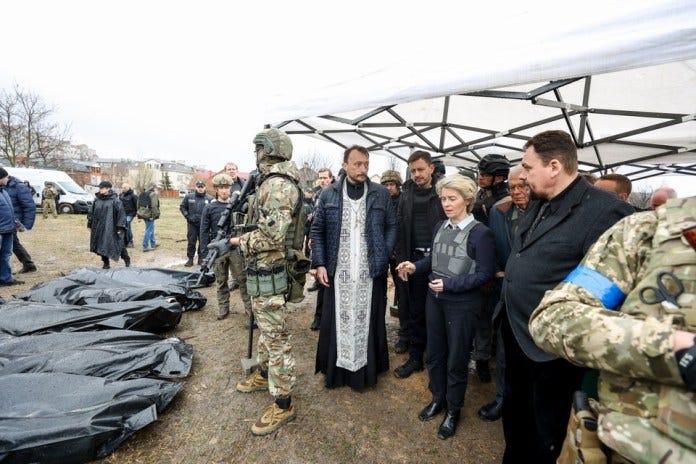
As it turns out, Ursula has family ties to this area as well. The last time a von der Leyen was in Ukraine, Ursula’s distant relative Joachim was bringing “European values” to Ukraine as the Nazi Gaultier of Galicia. In what the Nazis called Operation Reinhard, the region was rendered “Juden Frei” thanks to the diligent efforts of Ukrainian nationalists, who served as punishers for the Nazi regime, only to escape punishment thanks to the efforts of the United States and NATO.
Now, Joachim’s descendant stands with those of the nationalists once more, bringing death and devastation to the people of Ukraine and the world. How many more must die this time for the “European values” of Ursula von der Leyen?
Originally published on Covert Action Magazine






Thanks Cynthia, this is great research. This needs to be spread everywhere. I am doing my best to do so.
Wow.
Shared this one all over the globe.